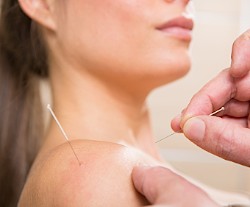Researchers conclude that acupuncture effectively reduces frozen shoulder pain and restores functionality. Frozen shoulder, also known as adhesive capsulitis, is a disorder of the connective tissue in the rotator cuff region wherein there is pain, inflammation and motor impairment.  All patients in the study suffered from shoulder periarthritis resulting in adhesive capsulitis. Two types of acupuncture were compared. Local acupuncture points scored a 71.8% effective rate and abdominal style acupuncture scored a 92.4% effective rate. The researchers concluded that acupuncture relieves frozen shoulder pain and improves shoulder functional ability.
All patients in the study suffered from shoulder periarthritis resulting in adhesive capsulitis. Two types of acupuncture were compared. Local acupuncture points scored a 71.8% effective rate and abdominal style acupuncture scored a 92.4% effective rate. The researchers concluded that acupuncture relieves frozen shoulder pain and improves shoulder functional ability.
A group of 157 cases of shoulder periarthritis characterized by adhesive capsulitis was randomly divided into 2 groups. Group 1 consisted of 79 patients who received abdominal style acupuncture. The acupuncture points used on these patients were CV12 (Zhongwan), KI17 (Shangqu) and ST24 (Huaroumen). Group 2 consisted of 78 patients who received acupuncture at local body style points: LI15 (Jianyu), TB14 (Jianliao), SI9 (Jianzhen). Treatment was administered at a rate of 3 times per week until a total of 10 treatments were achieved. The effective rate for the abdominal acupuncture group scored significantly higher than the local acupuncture group in this research conducted at Zhejiang Hospital of TCM, China.
German researchers came up with similar results in related research. Researchers at Ruhr-University Bochum (Orthopedic Surgery and Research) concluded that acupuncture is an effective alternative to conventional orthopedic treatments for chronic shoulder pain. A total of 424 patients were involved in the study. Each received 15 acupuncture treatments over a period of 6 weeks. Orthopedists were given rudimentary training in acupuncture and administered all acupuncture treatments. This is distinctly different than the Chinese study wherein acupuncture was applied by highly trained, licensed acupuncturists.
Three groups were compared in the German study. Group 1 of received true acupuncture. Group 2 received sham acupuncture. Group 3 received conventional orthopedic care. In a 3 month follow-up, the true acupuncture group had a 65% recovery rate, the sham acupuncture group had a 24% recovery rate and the conventional orthopedic group had a 37% recovery rate.
In another recent study of 17,922 patient outcomes, researchers determined that acupuncture is effective for the treatment of neck and back pain, osteoarthritis, headaches and shoulder pain. The researchers concluded, “Acupuncture is effective for the treatment of chronic pain and is therefore a reasonable referral option.” This large sample size meta-analysis included only randomized controlled trials with placebo (sham) controls. Additionally, the current episode of pain studied needed to be at least 4 weeks in duration and the follow-up needed to be no less than 4 weeks after the initial acupuncture treatment. Strict controls were also placed on data extraction, quality assessment, data synthesis and analysis. As such, the results are drawn from a quality sample and conclusions are drawn from quality investigations.
The investigators set out to create a review based on a high quality methodology. Randomized controlled trials of low quality were not admitted into the meta-analysis. The researchers included investigators from the Departments of Epidemiology and Biostatisitcs at Memorial Sloan-Kettering Cancer Center in New York City. Other researchers hailed from the Center for Outcomes and Policy Research Dana Farber Cancer Institute in Boston, Massachusetts and other prestigious institutions including the University of York, the Group Health Research Institute in Seattle, Washington, the University of Southhampton and other top notch institutions.
Many high quality investigations have been completed in the last several years on the efficacy of acupuncture for the treatment of chronic pain and other conditions. This includes both primary and secondary research using only randomized controlled trials. This latest research on the efficacy of acupuncture for the treatment of shoulder pain assists efforts in the proper integration of acupuncture into conventional pain management protocols.
References:
Mo, X. F., L. H. Xuan, Y. B. Jin, X. H. Cheng, and B. Y. Yu. "[Efficacy observation on abdominal acupuncture for adhesion-stage shoulder periarthritis]." Zhongguo zhen jiu= Chinese acupuncture & moxibustion 33, no. 9 (2013): 847-849. Department of Acupuncture and Moxibustion, Zhejiang Hospital of TCM, Hangzhou, China.
Pain. 2010 Oct;151(1):146-54. Epub 2010 Jul 23. German Randomized Acupuncture Trial for chronic shoulder pain (GRASP) - a pragmatic, controlled, patient-blinded, multi-centre trial in an outpatient care environment. Molsberger AF, Schneider T, Gotthardt H, Drabik A.
Vickers AJ, Cronin AM, Maschino AC, et al. Acupuncture for Chronic Pain: Individual Patient Data Meta-analysis. Arch Intern Med. Published online September 10, 2012. doi:10.1001/archinternmed.2012.3654.


